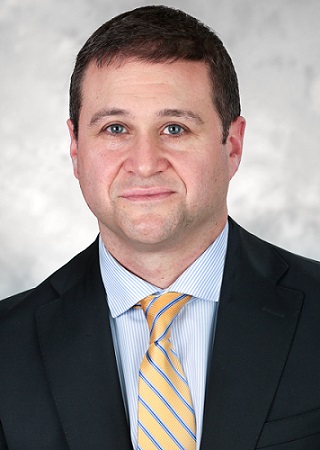Dr. Elias Hyams joined the Brown Urology staff in February, arriving at the practice after holding leadership positions at Columbia University and New York Presbyterian-Lawrence Hospital.
Hyams specializes in the diagnosis and treatment of prostate cancer and in minimally invasive urological surgery.
PBN: Before coming to Rhode Island, you were associate professor of urology at Columbia University-Irving Medical Center and chief of urology at New York Presbyterian-Lawrence Hospital. What brought you to Brown Urology?
HYAMS: I came to Brown for a couple of reasons. First, to join an outstanding group of multidisciplinary providers in the treatment of urological cancer. The Cancer Center and multidisciplinary clinic with medical, radiation and urological oncology are deeply committed to outstanding, compassionate and cutting-edge care.
Furthermore, within the urology department, there is a commitment to the holistic treatment of patients, with an emphasis on quality of life such as urinary and sexual function in parallel to effective treatment of cancer.
Second, Rhode Island is a uniquely wonderful state where there is natural beauty, cosmopolitan options and a diverse population to live among.
PBN: How do you approach screening, diagnosing and treating prostate cancer? Are there some ways that you believe the traditional process could be improved?
HYAMS: Screening, diagnosis and treatment of prostate cancer need to be individualized. All men are unique in their risk factors, health status, preferences and priorities. My goal is to use state-of-the-art risk stratification tools such as blood and urine biomarkers, imaging and genetic testing when appropriate to help men understand their risk and their options.
For treatment, I work with a multidisciplinary team to ensure men are aware of the range of options from surveillance to more invasive treatments, tailored to risk level and preferences. The goal is to avoid over-detection of slow-growing prostate cancer that will not cause harm, ensure early detection of more aggressive cancer, and allay anxiety and maintain quality of life through the process.
PBN: Please explain a bit about the robotic procedures you perform. What is the advantage to patients, and have you done any of these surgeries in Rhode Island yet?
HYAMS: I perform a high volume of robotic prostatectomy, which is a contemporary form of laparoscopic surgery. Robotic surgical systems have more dexterity and precision than conventional laparoscopic surgery and are particularly well-suited for minimally invasive surgery in tight areas of the body such as the pelvis.
Robotic prostatectomy has a lower risk of bleeding and a more rapid convalescence than traditional open prostatectomy and is the standard of care for surgical management of prostate cancer.
PBN: What sort of a team are you working with at Brown Urology’s cancer center?
HYAMS: The team at the cancer center is multidisciplinary.
PBN: Are there other conditions besides prostate cancer that you are an expert in?
HYAMS: I also treat kidney cancer, benign prostate enlargement, bothersome urinary symptoms, particularly in men, and other urological conditions that need to be treated urgently.
Elizabeth Graham is a PBN contributing writer.













